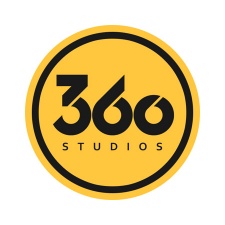It's the day before 360 Studio's first game, MMA Federation, is released, and there's an eerie silence in the office.
Everyone in the team of around 20 people is still focused on the game.
You might've thought that some would have sneaked off to Manchester's Northern Quarter, a trendy area not far from the office, for a quiet, celebratory drink, but the hushed chatter points to another late finish for the team.
Creative Director Phil Goddard is going between the different "departments", checking in on progress.
Director Sean Salloux is checking a seemingly endless list of emails. Both are so busy that they weren't entirely aware they were being interviewed today.
But, after a quick stop at the kitchen for a glass of water, they sit down and start to discuss how they came to meet one another and start on their journey to the release of MMA Federation.
In the blue corner...
Goddard started off in graphic design, eventually getting into casual games through his experience with Flash. In 2006 he went freelance, and started working with social games company Dubit.
From here, Goddard cemented himself further in the games industry, eventually joining Rivet Studios as its Creative Director in 2012.
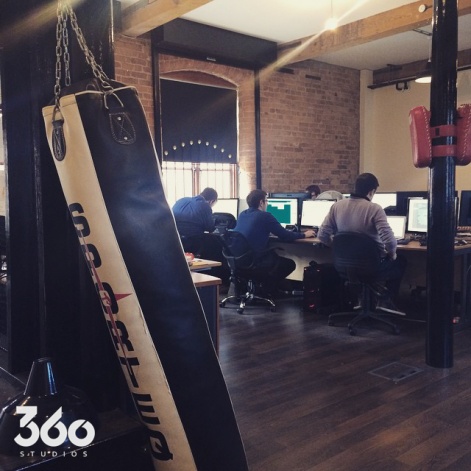
But MMA was always Goddard's passion.
Everything's been positive about this game, there's been a huge amount of support out there.Phil Goddard
He has around 200 hours on the mat in Brazilian Jiu Jitsu, and in October 2013 he finally got the opportunity to bring his game design knowledge and MMA interest together after a meeting with Salloux.
And in the red corner...
Salloux wanted to make games since he was a kid, but when it came time to actually study at college, his dreams were shot down.
He was told that "no one makes games, there's no industry, you can't make a living", and instead moved into technology generally, working in mobile technology with Gemalto, and founding World Energy Labs in 2002.
So when Apple started pushing the App Store, Salloux was incredibly excited. "I said, oh my God, all the stuff I've been working on and I've dreamed about doing is going to happen!"
Salloux too is an MMA fan, with a few Judo belts to his name, and found himself being courted by MMA superstars asking if he would be interested in working on an MMA game after developer THQ shut its doors.
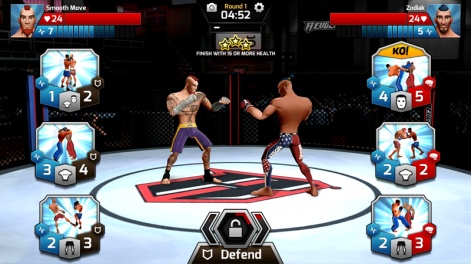
"I'm not comfortable raising $20 million," he says,
"I've raised 10 or 15 for various companies I've worked with, but $20 million seems too high for a game."
Manchester seemed like the perfect place to start making the game.
"But for $1 million we could make a really good mobile game."
Work the body
With that in mind, he decided to start 360 Studios, with the idea of creating a mobile MMA game that offered real world rewards for its players.
Salloux started shopping around for developers in London and was introduced to Goddard. The two connected over their mutual love of the sport, and they went into business together.
But Goddard, who was born and bred in Manchester, was keen to keep development up North. He cites the creativity of the city, from its vibrant music scene to its graphic design industries, as reasons for wanting to stay in the area.
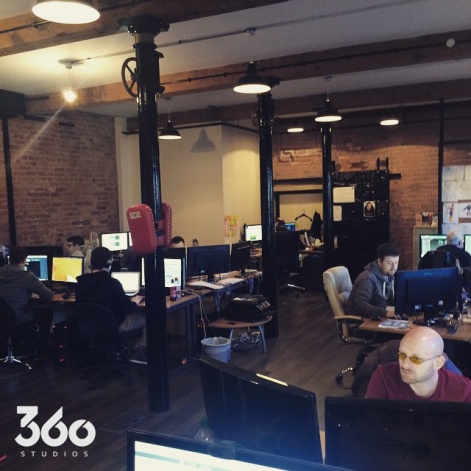
"Just because video games, traditionally, hasn't been a huge for Manchester specifically," he says, "I think there's a lot of potential from skillsets from other industries to make it into video games."
There's also a wealth of university talent on their doorstep, with a dedicated game design university, Futureworks, based in the Manchester City Centre.
"We have a good relationship with Bolton University," says Salloux, "There's a 360 Studio over there."
Add to that a wealth of smaller, indie developers already based in the North, and Manchester seemed like the perfect place to start making the game.
Pack a punch
Development began in November 2013, with the game starting life as a stats-driven management sim, and the studio took to Kickstarter to help fund it.
"If you've ever thought about doing anything like that, give yourself six months planning beforehand," sighs Goddard.
Without much marketing, the game found an audience, with funding coming in from around the world and a month of 20-hour working days to keep on top of everything.
"I've never worked on a game where people were calling me up and asking if they could give me money," laughs Salloux.
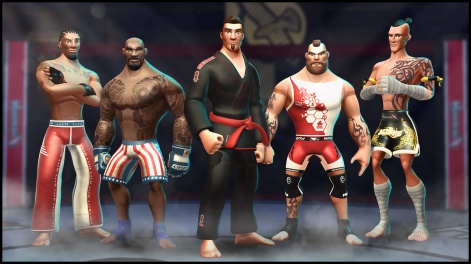
Realising that a management sim was perhaps too niche for a mobile audience, the team then turned to the CCG genre, taking inspiration from Hearthstone and other popular card-battlers.
The game continued to gain traction in the MMA community during these changes, and eventually caught the eye of Rick Giolito.
Haymaker
A former EA executive producer, who worked on major titles such as Knockout Kings and the Medal of Honor series, Giolito is also an MMA enthusiast and proved incredibly valuable to the future of MMA Federation.
Giolito liked what the team had, but decided it needed to be "bigger" – animated fights, customization, real-world fighters.
"He was the first guy to bring in real fighters, and the promotions and the brands, and bring in a real experience," explains Goddard.
Salloux had already been in contact with people in the MMA world, garnering interest in the project and having them offer their brands and products to the game, and it was this that interested Giolito the most.
"[Giolito] saw a huge parallel with what he'd done previously with boxing, and now he had an opportunity to do it again with MMA," says Goddard.
But, as Goddard points out, "Rick had never worked on anything that wasn't triple-A." Giolito liked what the team had, but decided it needed to be "bigger" – animated fights, customization, real-world fighters.
"He pushed the boundaries on what to shoot for," says Goddard.
Sweep the leg
Giolito's influence changed the game into what it finally became – a mix of strategy and CCG, the product of which has only been in development for around a year.
They had hoped to launch the game before anyone else got into the MMA market, but these hopes were dashed when EA ported its UFC game to mobile – despite having previously saying they had no plans to, and being fully supportive of 360 Studios' effort.
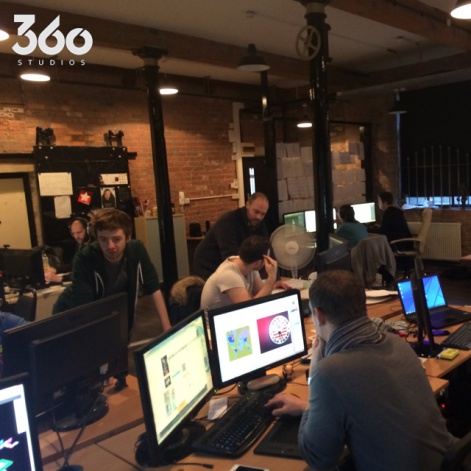
But this may have worked in the smaller studio's favour.
As Salloux puts it, "it showed the huge appetite for a high quality MMA game," which helped when it came to pitching the game to third parties for additional funding.
Punches in bunches
The game eventually soft-launched in Canada, because "traditionally it was better representative of the US market and how it would perform," says Goddard.
"In hindsight, we probably would have opened it up to more territories purely based on marketing and user acquisition cost."
They did eventually open to a new territory, the Philippines, but only in the week before the game's general release.
"The results have been astounding," says Goddard. "I think we hit number 30," chips in Salloux.
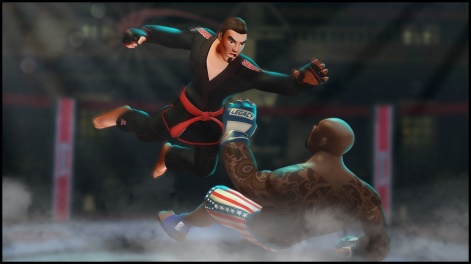
But Canada was still an important territory regardless of the cost, because of Salloux's contacts in the territory, allowing them to test how willing the partners would be in pushing the game out.
It seemed to have gone well for them, though. "Right before Thanksgiving we were the number one sports fighting game [in Canada]," says Salloux.
Technical knockout
And that means that the team were looking forward to the game's release, instead of worrying about how the launch might go.
The team is working in sprints, with a new update planned each month until April 2016.
"Everything's been positive about this game, there's been a huge amount of support out there," says Goddard, "we're excited for it."
But there's still plenty that they want to get into the game. The team is working in sprints, with a new update planned each month until April 2016, focusing on new content, improved social aspects, and even adding female fighters to the mix.
"When we first started building the game, all the top people in MMA openly and publicly said, 'there will never be female fighters at the top'," explains Salloux, "and we were like, well we're gonna be the first."
Sadly, they missed this opportunity, due to their small team having to focus their efforts elsewhere and the unpredictable meteoric rise of Ronda Rousey, but this in itself has shown a clear need for the addition of female fighters.
Rising through the ranks
There's also talks of putting the game engine to use with other types of fighting games, which Salloux's contacts are very interested in.
One partner in Japan wants to get involved on a sumo edition, for example.
And there could be a whole new game in the works, once the main foundation is in place. Goddard says that there's a lot more the game could do, particular with the environment.
"The cage should bring some PvE style movement in the game," he says, "but that would require a massive overhaul."
Such a huge change would require a lot of work, particularly for such a relatively small team, but Goddard doesn't want to expand the studio just yet.
A Cinderella story
"In terms of the actual team working on the product at any one time, I'd like to keep it not much larger than we are now," he says.
"We've got a good team," Salloux adds, "a very good team."
If there's one thing you can tell from Goddard and Salloux, it's that they're both incredibly proud of what they've created at 360 Studios.
And they're right to be.
With a clear plan for the future, support to back them, and the influence of Giolito to guide them, these are exciting times for what in fighting terms could be considered a plucky contender.

